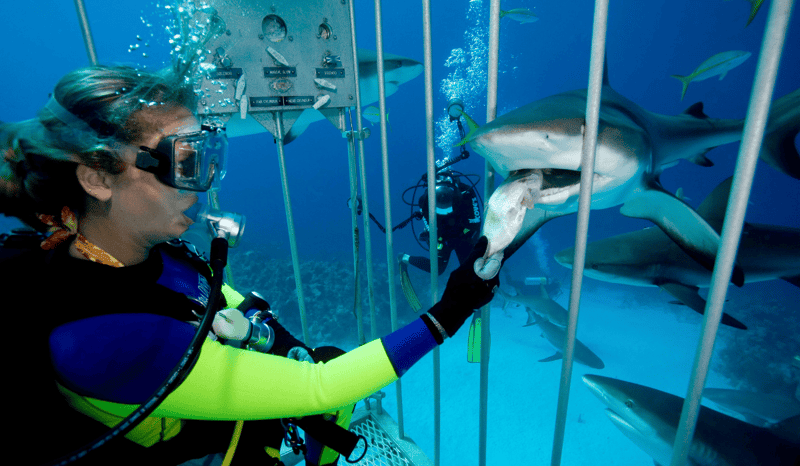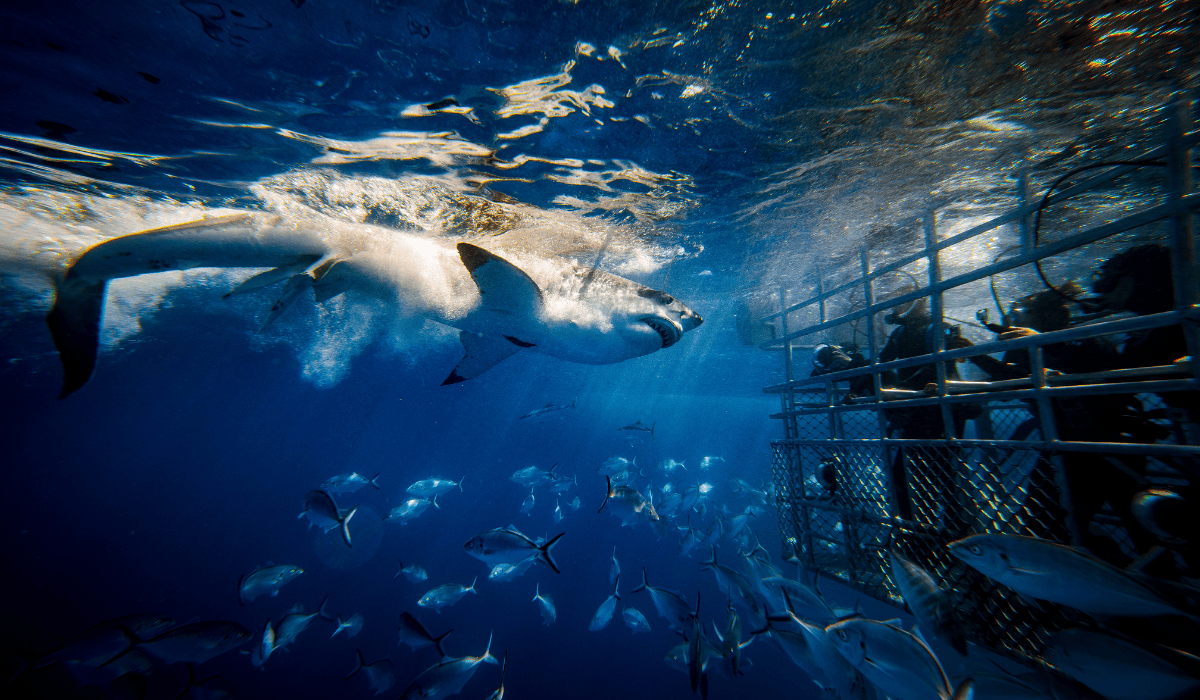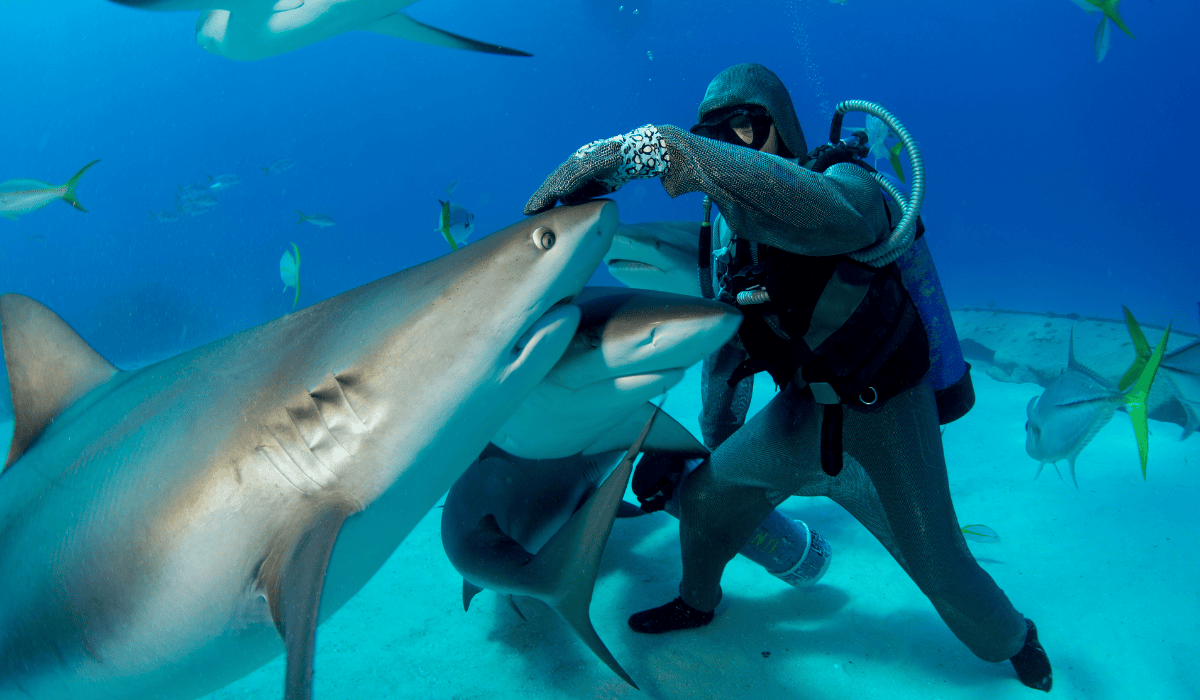
Swimming with whale sharks. Cage diving with great whites. Can shark tourism ever be ethical? We break down the facts and how you can ethically see these animals in the wild.
Each year, Shark Week floods our screens with close-ups of thrashing fins, ominous music, and the promise of adrenaline-pumping shark encounters. It’s the perfect marketing backdrop for a growing tourism industry that profits from our fascination with these misunderstood ocean giants.
But behind the glossy brochures for cage diving and baited swim encounters lies a murkier truth—one that raises real questions about animal protection, human safety, and whether these activities help or harm shark conservation.
At World Animal Protection, we believe animals should be seen and protected for who they are, not exploited for entertainment. So, is shark tourism truly conservation, or just another way we’re putting profit before animals?
What Is Shark Tourism?
Shark tourism encompasses a range of activities, including:
- Cage diving: Lowering tourists into the water to view sharks, often with bait used to attract them.
- Feeding dives: Divers observe or participate in shark feeding to bring animals closer.
- Swim-with-shark tours: Often done with whale sharks or reef sharks, typically in open water.
These activities are often marketed as eco-tourism or conservation-focused. And in theory, exposing people to sharks could help shift public perception away from the “man-eater” myth. But how these encounters are managed can have serious consequences for sharks and the ecosystems they’re a part of.
Baiting and Feeding: Unnatural and Unethical

To guarantee sightings, many operators bait sharks with fish or chum, conditioning them to associate humans with food. Over time, this changes their natural behavior, drawing them closer to boats, swimmers, and shoreline areas where they might not typically venture.
According to researchers, this baiting can:
- Alter sharks’ movement patterns and increase stress levels.
- Heighten the risk of shark-human conflicts.
- Disrupt marine food webs by unnaturally concentrating apex predators in one area.
This isn’t conservation. It’s conditioning sharks into unnatural patterns for human thrill-seeking at the animals’ expense.
Sharks Aren’t Photo Ops

Many “swim-with” tours promise up-close selfies with species like whale sharks—some even encourage touching them. But interactions like these can be harmful, even if the species seems docile.
Whale sharks are filter feeders that are highly sensitive to sound and touch. Constant boat traffic and physical contact from tourists can cause distress and interfere with critical behaviors like feeding and migrating.
A study in the Philippines found that whale sharks altered their natural behaviors due to heavy tourism—surfacing less often, changing direction, and even avoiding areas where they’d been fed or touched. Again, this isn’t harmless fun. It’s disrupting wild lives for human entertainment.
Real Conservation Looks Different
Shark tourism doesn’t have to be harmful, but it must put the animal first. That means:
- No feeding or baiting.
- No touching or chasing animals.
- No enclosures or confinement.
- No exploitation for profit.
Responsible shark experiences prioritize observation from a distance, use trained naturalists to educate tourists, and take place in designated marine protected areas.
Sharks Deserve Respect
The fascination with sharks is understandable. They’re awe-inspiring, ancient predators vital to ocean health. But they’re also one of the most misunderstood and exploited animals on the planet. Whether they’re being finned for soup, killed as bycatch, or used as bait for the next viral selfie, sharks are paying the ultimate price.
Let’s challenge the idea that “seeing is saving” if it comes at the cost of stress, captivity, or conditioning. Conservation isn’t about how close we can get to wild animals—it’s about how far we’re willing to go to protect them.
Want to protect sharks year-round?
- Say no to seafood and shark fin products.
- Avoid tourist attractions that feed, bait, or confine wild animals.
- Support organizations fighting to protect marine life without exploiting them.
To get started, join World Animal Protection’s FREE Animal Champions community, where we’ll keep you updated on the best ways to protect animals year-round.